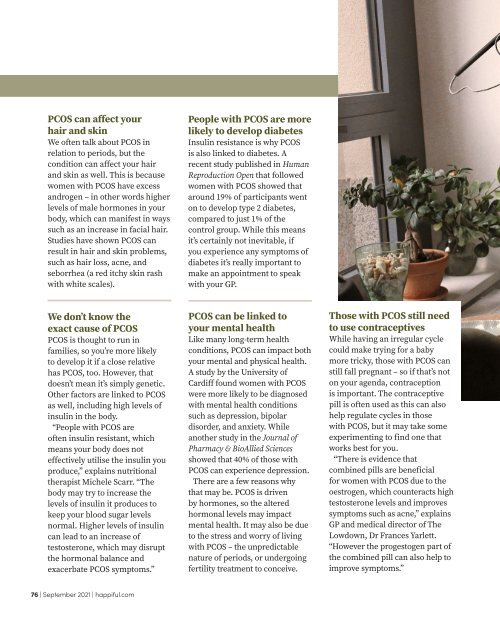You also want an ePaper? Increase the reach of your titles
YUMPU automatically turns print PDFs into web optimized ePapers that Google loves.
PCOS can affect your<br />
hair and skin<br />
We often talk about PCOS in<br />
relation to periods, but the<br />
condition can affect your hair<br />
and skin as well. This is because<br />
women with PCOS have excess<br />
androgen – in other words higher<br />
levels of male hormones in your<br />
body, which can manifest in ways<br />
such as an increase in facial hair.<br />
Studies have shown PCOS can<br />
result in hair and skin problems,<br />
such as hair loss, acne, and<br />
seborrhea (a red itchy skin rash<br />
with white scales).<br />
People with PCOS are more<br />
likely to develop diabetes<br />
Insulin resistance is why PCOS<br />
is also linked to diabetes. A<br />
recent study published in Human<br />
Reproduction Open that followed<br />
women with PCOS showed that<br />
around 19% of participants went<br />
on to develop type 2 diabetes,<br />
compared to just 1% of the<br />
control group. While this means<br />
it’s certainly not inevitable, if<br />
you experience any symptoms of<br />
diabetes it’s really important to<br />
make an appointment to speak<br />
with your GP.<br />
We don’t know the<br />
exact cause of PCOS<br />
PCOS is thought to run in<br />
families, so you’re more likely<br />
to develop it if a close relative<br />
has PCOS, too. However, that<br />
doesn’t mean it’s simply genetic.<br />
Other factors are linked to PCOS<br />
as well, including high levels of<br />
insulin in the body.<br />
“People with PCOS are<br />
often insulin resistant, which<br />
means your body does not<br />
effectively utilise the insulin you<br />
produce,” explains nutritional<br />
therapist Michele Scarr. “The<br />
body may try to increase the<br />
levels of insulin it produces to<br />
keep your blood sugar levels<br />
normal. Higher levels of insulin<br />
can lead to an increase of<br />
testosterone, which may disrupt<br />
the hormonal balance and<br />
exacerbate PCOS symptoms.”<br />
PCOS can be linked to<br />
your mental health<br />
Like many long-term health<br />
conditions, PCOS can impact both<br />
your mental and physical health.<br />
A study by the University of<br />
Cardiff found women with PCOS<br />
were more likely to be diagnosed<br />
with mental health conditions<br />
such as depression, bipolar<br />
disorder, and anxiety. While<br />
another study in the Journal of<br />
Pharmacy & BioAllied Sciences<br />
showed that 40% of those with<br />
PCOS can experience depression.<br />
There are a few reasons why<br />
that may be. PCOS is driven<br />
by hormones, so the altered<br />
hormonal levels may impact<br />
mental health. It may also be due<br />
to the stress and worry of living<br />
with PCOS – the unpredictable<br />
nature of periods, or undergoing<br />
fertility treatment to conceive.<br />
Those with PCOS still need<br />
to use contraceptives<br />
While having an irregular cycle<br />
could make trying for a baby<br />
more tricky, those with PCOS can<br />
still fall pregnant – so if that’s not<br />
on your agenda, contraception<br />
is important. The contraceptive<br />
pill is often used as this can also<br />
help regulate cycles in those<br />
with PCOS, but it may take some<br />
experimenting to find one that<br />
works best for you.<br />
“There is evidence that<br />
combined pills are beneficial<br />
for women with PCOS due to the<br />
oestrogen, which counteracts high<br />
testosterone levels and improves<br />
symptoms such as acne,” explains<br />
GP and medical director of The<br />
Lowdown, Dr Frances Yarlett.<br />
“However the progestogen part of<br />
the combined pill can also help to<br />
improve symptoms.”<br />
76 | September <strong>2021</strong> | <strong>happiful</strong>.com

















